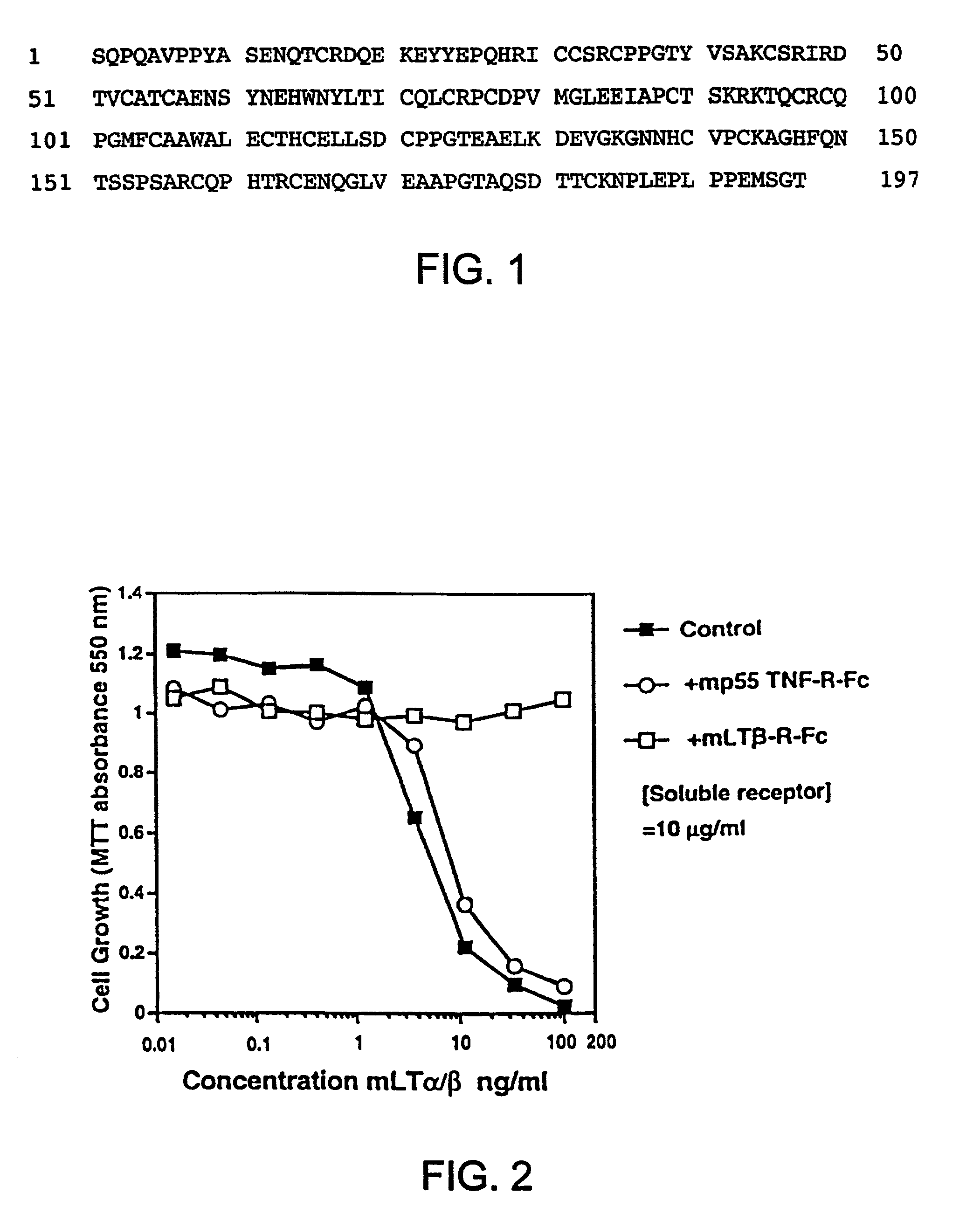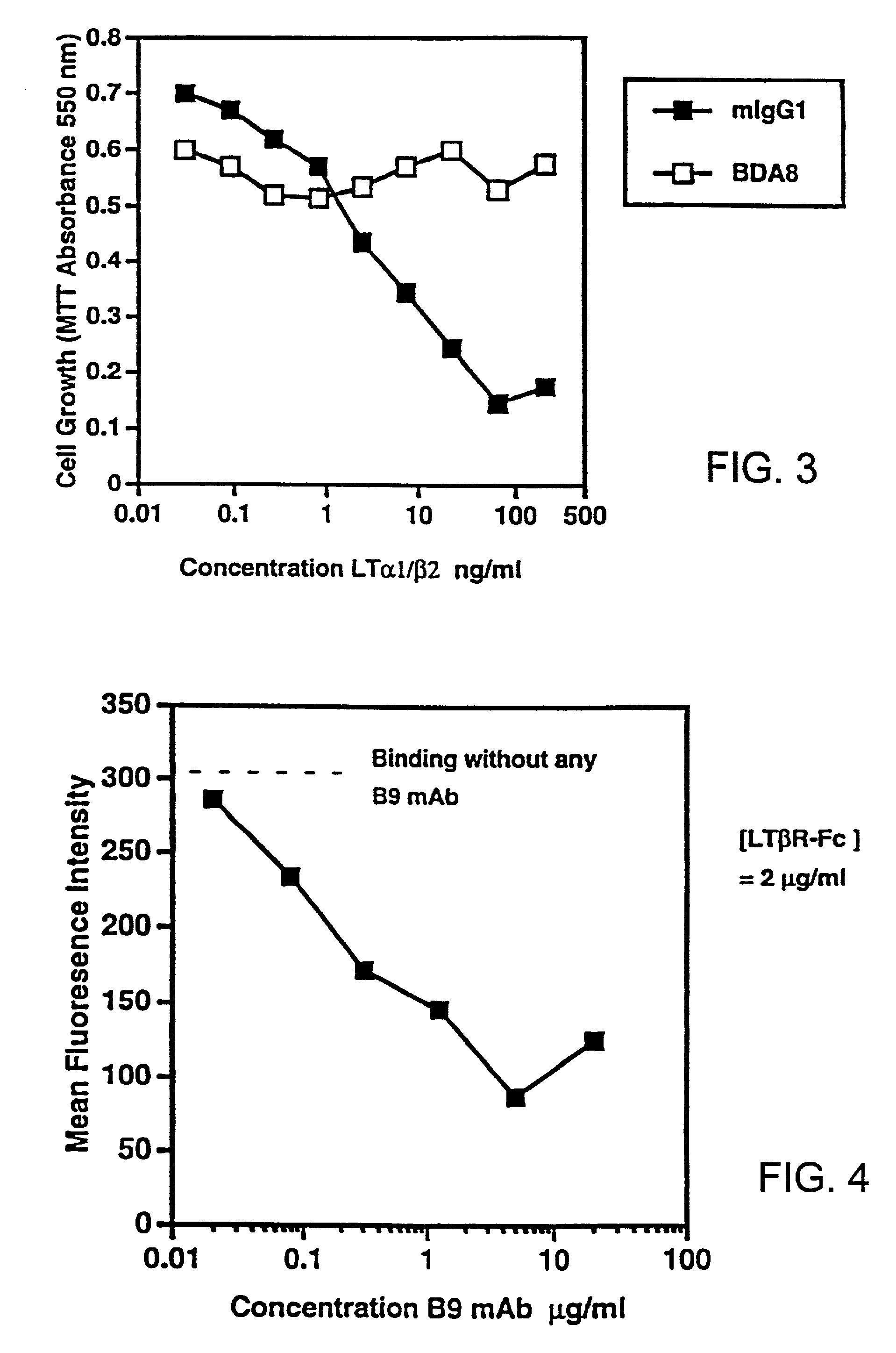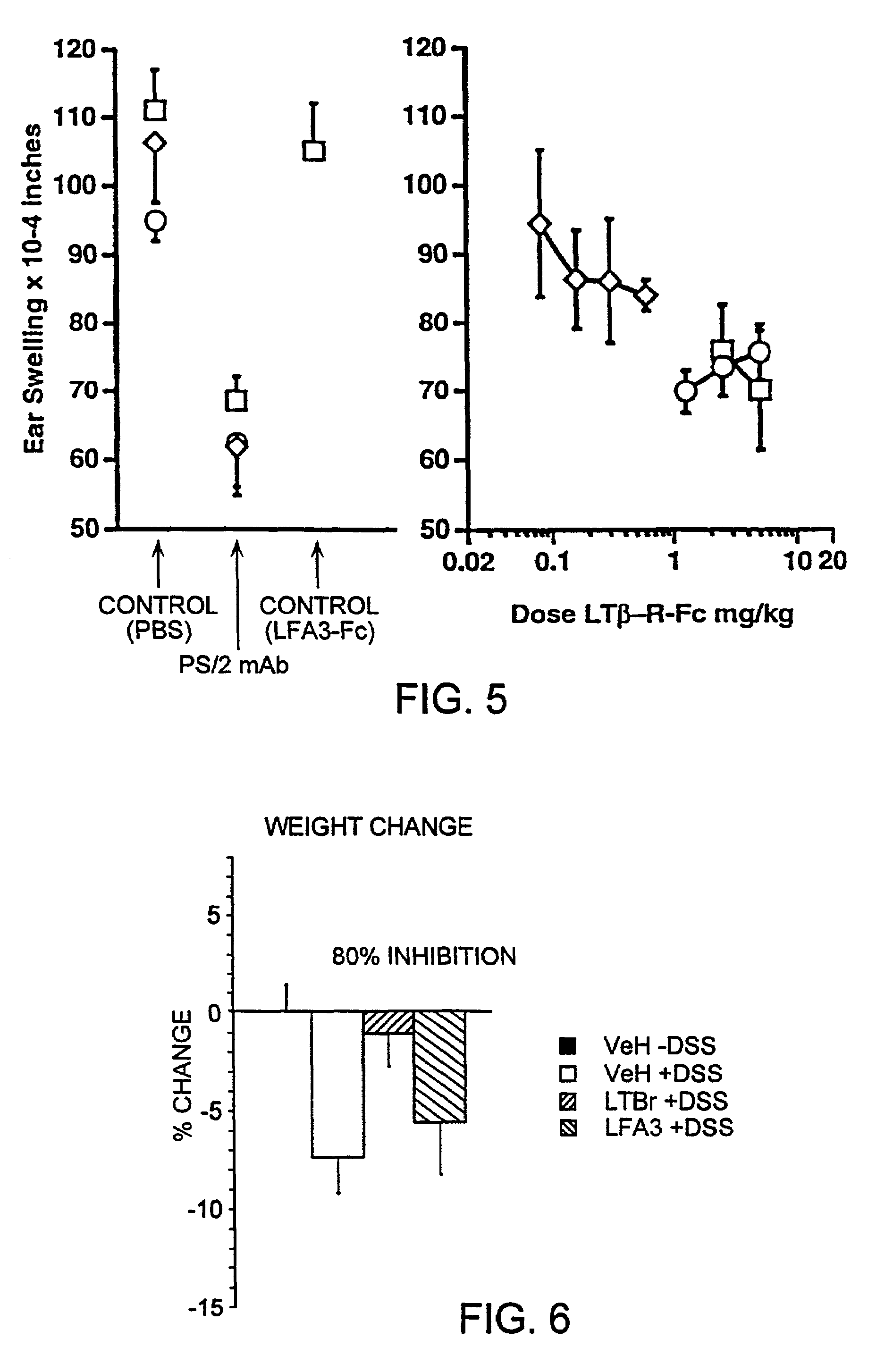Methods for inhibiting lymphotoxin β receptor signalling
a technology of lymphotoxin and signalling, which is applied in the direction of depsipeptides, peptide/protein ingredients, fusion polypeptides, etc., can solve the problems of unsuitable long-term therapies, adverse side effects, and deleterious effects of inhibiting their production on non-t cell mediated responses, and achieves the effect of increasing the sensitivity of human adenocarcinoma cells
- Summary
- Abstract
- Description
- Claims
- Application Information
AI Technical Summary
Benefits of technology
Problems solved by technology
Method used
Image
Examples
example 1
Preparation of Soluble Human LT-β Receptors as Immunoglobulin Fc Fusion Proteins
[0193]The sequence of a human cDNA clone isolated from a library of human 12p transcribed sequences derived from a somatic cell hybrid (Baens et al., Genomics, 16, pp. 214-18 (1993)), was entered into GenBank and was later identified as the sequence which encodes human LT-β-R. The sequence of this full-length human LT-β-R cDNA clone has been available since 1992 as GenBank entry L04270.
[0194]The extracellular domain of LT-β-R up to the transmembrane region (FIG. 11 was amplified by PCR from a cDNA clone using primers that incorporated NotI and SalI restriction enzyme sites on the 5′ and 3′ ends, respectively (Browning et al., J. Immunol., 154, pp. 33-46 (1995)). The amplified product was cut with NotI and SalI, purified and ligated into a NotI-linearized vector pMDR901 along with a SalI-NotI fragment encoding the Fc region of human IgG1. The resultant vector contained the dihydrofolate reductase gene and...
example 2
Preparation of Soluble Murine LT-β Receptors as Immunoglobulin Fc Fusion Proteins
[0196]A complete cDNA clone of the mLT-β-R was prepared by ligating a 5′ NotI / ApaLI and 3′ ApaLI / NotI fragments from two partial cDNA isolates into the NotI site of pCDNA3 (InVitrogen, San Diego, Calif.). The sequence of this cDNA clone is accessible as GenBank entry U29173. No coding sequence differences were noted when compared with another sequence entry for mLT-β-R found in GenBank entry L38423.
[0197]A soluble mLT-β-R (hIgG1) fusion protein was prepared by PCR amplification of the full length mLT-β-R cDNA clone as a template and the primers 5′ AACTGCAGCGGCCGCCATGCGCCTGCCC 3′ and 5′ GACTTTGTCGACCATTGCTCCTGGCTCTGGGGG 3′. The amplified product was purified and cut with NotI and SalI and ligated with a SalI / NotI human IgG1 Fc fragment into NotI-linearized and phosphatase-treated SAB132 to form JLB 122. For stable expression, the NotI cassette containing the mLT-β-R-Fc fragment was transferred into the N...
example 3
Use of Soluble Human LT-β-R-Fc to Block LT-β Receptor-Ligand Interactions
[0198]Soluble hLT-β-R-Fc was tested for its ability to block LT ligand binding to the LT-β receptor in the tumor cell cytotoxicity assay described above. In this assay, a soluble form of the LT ligand (hLT-α1 / β2), which activates LT-β-R signalling, is used to kill human tumor cells. Inhibitors of LT-β-R signalling can reduce LT-β-R-induced tumor cell cytotoxicity.
[0199]Soluble LT-α1 / β2 ligands comprise truncated or modified LT-β subunits lacking a functional transmembrane domain. Soluble LT-α1 / β2 ligands bind to and stimulate LT-β-R signalling as well as surface forms of LT ligand (Browning et al., J. Immunol., 154, pp. 33-46 (1995)).
[0200]Serial dilutions of hLT-α1 / β2, hTNF or hLT-α were prepared in 0.05 ml in 96 well plates and 5000 trypsinized HT29 cells (ATCC) added in 0.05 ml media containing 80 U / ml (antiviral units) of hu-IFN-γ. After 4 days, mitochondrial reduction of the dye MTT was measured as follows...
PUM
| Property | Measurement | Unit |
|---|---|---|
| concentration | aaaaa | aaaaa |
| concentrations | aaaaa | aaaaa |
| concentrations | aaaaa | aaaaa |
Abstract
Description
Claims
Application Information
 Login to View More
Login to View More - R&D
- Intellectual Property
- Life Sciences
- Materials
- Tech Scout
- Unparalleled Data Quality
- Higher Quality Content
- 60% Fewer Hallucinations
Browse by: Latest US Patents, China's latest patents, Technical Efficacy Thesaurus, Application Domain, Technology Topic, Popular Technical Reports.
© 2025 PatSnap. All rights reserved.Legal|Privacy policy|Modern Slavery Act Transparency Statement|Sitemap|About US| Contact US: help@patsnap.com



